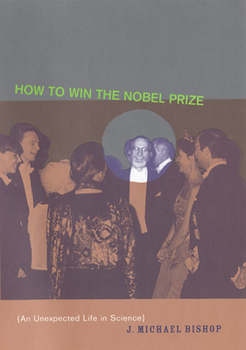How to Win the Nobel Prize: An Unexpected Life in Science
Select Format
Select Condition 
Book Overview
In 1989 Michael Bishop and Harold Varmus were awarded the Nobel Prize for their discovery that normal genes under certain conditions can cause cancer. In this book, Bishop tells us how he and Varmus made their momentous discovery. More than a lively account of the making of a brilliant scientist, How to Win the Nobel Prize is also a broader narrative combining two major and intertwined strands of medical history: the long and ongoing struggles...
Format:Paperback
Language:English
ISBN:0674016254
ISBN13:9780674016255
Release Date:October 2004
Publisher:Harvard University Press
Length:288 Pages
Weight:0.76 lbs.
Dimensions:0.8" x 5.5" x 8.3"
Customer Reviews
1 rating
Noble Work
Published by Thriftbooks.com User , 19 years ago
This is, of course, not a how-to on winning the Nobel Prize. Rather it is Bishop's personal account of what happened when he won the Nobel Prize in "physiology or medicine" in 1989. This is told in a rather light-hearted, self deprecating way that is at once amusing and informative--he provides plenty of background on the prize itself, as well as the logistics of the ceremony of the presentation. Actually the book is something of a grab-bag of topics. It is partly autobiographical, partly historical accounts of cancer research, and partly a commentary on the issues of the public's perception and misperceptions on science and society. And partly about the discovery that he and Harold Varmus made--the first oncogene. Although I much enjoyed the other parts, it was to learn something of the discovery itself that brought me to buy the book. And here I must say I was a little disappointed. Basically, they found that one of the four genes carried by the Rous sarcoma virus is also found in the dna of many species of animals, including man. In fact it is found in normal cells, as well as those that are cancerous, and is expressed in both. I found this all a bit confusing. Is it the over-expression of the SRC gene responsible for some cancers, or is it a damaged form of the gene that is responsible? Is it an oncogene or a proto-oncogene? What does it do? The current paradigm for cancer causation is that one of a few oncogenes and/or tumor supressor genes malfunction to give rise to cancer. I had hoped for a clearer statement of this rather dogmatic idea, and perhaps even some pros and cons for it. What makes a gene qualify for oncogene status? This is never made clear. What has become of SRC? What has been found out in the 30 years since the discovery? Has anyone ever seen a cancer in which only the supposed oncogene is different from that seen in the normal cell? I don't think so. An opposing theory to this is that the fundamental event in cancer is aneuploidy: the cancer cell contains an abnormal number of chromosomes, thereby over-expressing some thousands of genes at once. Surprisingly, Bishop does not mention this alternative at all. Maybe the oncogene hypothesis is just plain wrong after all. And Peter Duesberg's paradigm is closer to the truth. Bishop's last chapter covers some of the public controversies: stem cells and cloning, genetic testing and evolution. He gives us his two cents worth on all of them, and I can't help but think he is right on most of what he says. He's got a lot of common sense, and expresses it pretty well.






